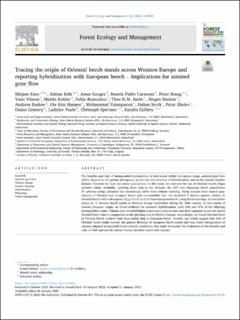Please use this identifier to cite or link to this item:
https://doi.org/10.21256/zhaw-26748| Publication type: | Article in scientific journal |
| Type of review: | Peer review (publication) |
| Title: | Tracing the origin of Oriental beech stands across Western Europe and reporting hybridization with European beech : implications for assisted gene flow |
| Authors: | Kurz, Mirjam Kölz, Adrian Gorges, Jonas Carmona, Beatriz Pablo Brang, Peter Vitasse, Yann Kohler, Martin Rezzonico, Fabio Smits, Theo H. M. Bauhus, Jürgen Rudow, Andreas Hansen, Ole Kim Vatanparast, Mohammad Sevik, Hakan Zhelev, Petar Gömöry, Dusan Paule, Ladislav Sperisen, Christoph Csilléry, Katalin |
| et. al: | No |
| DOI: | 10.1016/j.foreco.2023.120801 10.21256/zhaw-26748 |
| Published in: | Forest Ecology and Management |
| Volume(Issue): | 531 |
| Issue: | 120801 |
| Issue Date: | 26-Jan-2023 |
| Publisher / Ed. Institution: | Elsevier |
| ISSN: | 0378-1127 1872-7042 |
| Language: | English |
| Subjects: | Assisted gene flow; Climate change; Genetic diversity; Hybridization; Phenology; Forest management |
| Subject (DDC): | 572: Biochemistry 580: Plants (Botany) |
| Abstract: | The benefits and risks of human-aided translocation of individuals within the species range, assisted gene flow (AGF), depend on the genetic divergence, on the rate and direction of hybridization, and on the climate transfer distance between the host and donor populations. In this study, we explored the use of Oriental beech (Fagus sylvatica subsp. orientalis), growing from Iran to the Balkans, for AGF into European beech populations (F. sylvatica subsp. sylvatica) that increasingly suffer from climate warming. Using samples from natural populations of Oriental and European beech and microsatellite loci, we identified 5 distinct genetic clusters in Oriental beech with a divergence (FST) of 0.15 to 0.25 from European beech. Using this knowledge, we traced the origin of 11 Oriental beech stands in Western Europe established during the 20th century. In two stands of Greater Caucasus origin, we found evidence for extensive hybridization, with 18% and 41% of the offspring having hybrid status. Climate data revealed higher seasonality with warmer and drier summers across the native Oriental beech sites in comparison to the planting sites in Western Europe. Accordingly, we found that bud burst of Oriental beech occurred four days earlier than in European beech. Overall, our results suggest that AGF of Oriental beech could increase the genetic diversity of European beech stands and may foster introgression of variants adapted to expected future climatic conditions. Our study showcases the evaluation of the benefits and risks of AGF and call for similar studies on other native tree species. |
| URI: | https://digitalcollection.zhaw.ch/handle/11475/26748 |
| Related research data: | https://doi.org/10.5061/dryad.nzs7h44w6 |
| Fulltext version: | Published version |
| License (according to publishing contract): | CC BY 4.0: Attribution 4.0 International |
| Departement: | Life Sciences and Facility Management |
| Organisational Unit: | Institute of Natural Resource Sciences (IUNR) |
| Published as part of the ZHAW project: | Evaluation of benefits and risk of assisted migration in Fagus species |
| Appears in collections: | Publikationen Life Sciences und Facility Management |
Files in This Item:
| File | Description | Size | Format | |
|---|---|---|---|---|
| 2023_Kurz-etal_Origin-tracing-Oriental-beech-stands-Western-Europe.pdf | Article | 9.99 MB | Adobe PDF |  View/Open |
| 2023_Kurz-etal_Origin-tracing-Oriental-beech-stands-Western-Europe_Supp.pdf | Supplementary Material | 842.46 kB | Adobe PDF |  View/Open |
Show full item record
Kurz, M., Kölz, A., Gorges, J., Carmona, B. P., Brang, P., Vitasse, Y., Kohler, M., Rezzonico, F., Smits, T. H. M., Bauhus, J., Rudow, A., Hansen, O. K., Vatanparast, M., Sevik, H., Zhelev, P., Gömöry, D., Paule, L., Sperisen, C., & Csilléry, K. (2023). Tracing the origin of Oriental beech stands across Western Europe and reporting hybridization with European beech : implications for assisted gene flow. Forest Ecology and Management, 531(120801). https://doi.org/10.1016/j.foreco.2023.120801
Kurz, M. et al. (2023) ‘Tracing the origin of Oriental beech stands across Western Europe and reporting hybridization with European beech : implications for assisted gene flow’, Forest Ecology and Management, 531(120801). Available at: https://doi.org/10.1016/j.foreco.2023.120801.
M. Kurz et al., “Tracing the origin of Oriental beech stands across Western Europe and reporting hybridization with European beech : implications for assisted gene flow,” Forest Ecology and Management, vol. 531, no. 120801, Jan. 2023, doi: 10.1016/j.foreco.2023.120801.
KURZ, Mirjam, Adrian KÖLZ, Jonas GORGES, Beatriz Pablo CARMONA, Peter BRANG, Yann VITASSE, Martin KOHLER, Fabio REZZONICO, Theo H. M. SMITS, Jürgen BAUHUS, Andreas RUDOW, Ole Kim HANSEN, Mohammad VATANPARAST, Hakan SEVIK, Petar ZHELEV, Dusan GÖMÖRY, Ladislav PAULE, Christoph SPERISEN und Katalin CSILLÉRY, 2023. Tracing the origin of Oriental beech stands across Western Europe and reporting hybridization with European beech : implications for assisted gene flow. Forest Ecology and Management. 26 Januar 2023. Bd. 531, Nr. 120801. DOI 10.1016/j.foreco.2023.120801
Kurz, Mirjam, Adrian Kölz, Jonas Gorges, Beatriz Pablo Carmona, Peter Brang, Yann Vitasse, Martin Kohler, et al. 2023. “Tracing the Origin of Oriental Beech Stands across Western Europe and Reporting Hybridization with European Beech : Implications for Assisted Gene Flow.” Forest Ecology and Management 531 (120801). https://doi.org/10.1016/j.foreco.2023.120801.
Kurz, Mirjam, et al. “Tracing the Origin of Oriental Beech Stands across Western Europe and Reporting Hybridization with European Beech : Implications for Assisted Gene Flow.” Forest Ecology and Management, vol. 531, no. 120801, Jan. 2023, https://doi.org/10.1016/j.foreco.2023.120801.
Items in DSpace are protected by copyright, with all rights reserved, unless otherwise indicated.